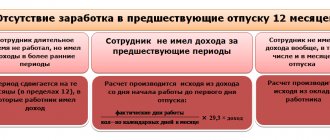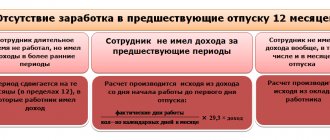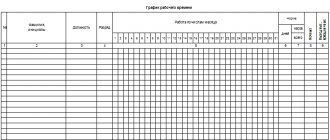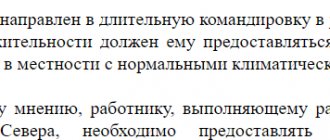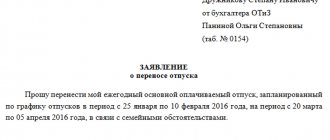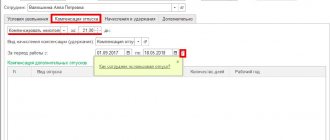Article 116. Annual additional paid leave
Annual additional paid leave is provided to employees engaged in work with harmful and (or) dangerous working conditions, employees with a special nature of work, employees with irregular working hours, employees working in the Far North and equivalent areas, as well as in other areas. cases provided for by this Code and other federal laws.
(as amended by Federal Law No. 90-FZ of June 30, 2006)
Employers, taking into account their production and financial capabilities, can independently establish additional leaves for employees, unless otherwise provided by this Code and other federal laws. The procedure and conditions for granting these leaves are determined by collective agreements or local regulations, which are adopted taking into account the opinion of the elected body of the primary trade union organization.
(as amended by Federal Law No. 90-FZ of June 30, 2006)
Article 119. Annual additional paid leave for employees with irregular working hours
Employees with irregular working hours are provided with annual additional paid leave, the duration of which is determined by a collective agreement or internal labor regulations and which cannot be less than three calendar days.
(as amended by Federal Law No. 90-FZ of June 30, 2006)
The procedure and conditions for granting annual additional paid leave to employees with irregular working hours in organizations financed from the federal budget are established by the Government of the Russian Federation, in organizations financed from the budget of a constituent entity of the Russian Federation - by the authorities of the constituent entity of the Russian Federation, and in organizations financed from local budget - local government bodies.
Vacation at your own expense
A citizen has the right to take several (the maximum limit is defined only for civil servants - 1 year) days at his own expense. Such time off is provided only upon application and in agreement with the administration, except for the following cases:
- WWII participants have the right to take an additional 35 calendar days off per year;
- working age pensioners - 14;
- working disabled people - 60;
- parents and wives (husbands) of military personnel, firefighters, etc. who died in the line of duty - 14.
In addition, the manager is required to sign an application for 5 days at his own expense in the event of the birth of a child, registration of marriage, or death of a close relative.
Article 120. Calculation of the duration of annual paid leave
The duration of the annual main and additional paid leaves of employees is calculated in calendar days and is not limited to a maximum limit. Non-working holidays falling during the period of annual main or annual additional paid leave are not included in the number of calendar days of leave.
(as amended by Federal Law No. 90-FZ of June 30, 2006)
When calculating the total duration of annual paid leave, additional paid leave is added to the annual main paid leave.
Dividing vacation into parts
The employee wants to split the remaining two weeks of vacation, but asks to provide all 14 days on weekdays. Does he have the right or should the vacation include weekends: 10 weekdays and 4 weekends?
The duration of the annual main and additional paid vacations of employees is calculated in calendar days (Part 1 of Article 120 of the Labor Code of the Russian Federation), which does not include only non-working holidays falling during the period of such vacations.
Thus, annual paid leave consists of working and calendar days. If an employee is given a full vacation (28 calendar days), it includes 8 days off. The 14-day part of the vacation includes 4 days off.
However, Part 1 of Art. 125 of the Labor Code of the Russian Federation establishes that all issues of dividing annual paid leave into parts (with the exception of the duration of the minimum unbroken part of 14 calendar days) are resolved by agreement between the employee and the employer. The Labor Code of the Russian Federation does not regulate the ratio of working days and weekends.
is obvious: if the employee wishes, and the employer does not object, i.e. the parties have reached an agreement on the issue, certain parts of the leave can be granted only on working days. If the employer has objections (this is his right), the parties need to come to a mutual agreement.
Article 121. Calculation of length of service giving the right to annual paid leave
(as amended by Federal Law No. 90-FZ of June 30, 2006)
The length of service that gives the right to annual basic paid leave includes:
actual work time;
the time when the employee did not actually work, but in accordance with labor legislation and other regulatory legal acts containing labor law norms, a collective agreement, agreements, local regulations, an employment contract, he retained his place of work (position), including the time of the annual paid leave, non-working holidays, days off and other rest days provided to the employee;
time of forced absence due to illegal dismissal or suspension from work and subsequent reinstatement to the previous job;
the period of suspension from work of an employee who has not undergone a mandatory medical examination (examination) through no fault of his own;
the time of unpaid leave provided at the request of the employee, not exceeding 14 calendar days during the working year.
(paragraph introduced by Federal Law dated July 22, 2008 N 157-FZ)
(Part one as amended by Federal Law No. 90-FZ dated June 30, 2006)
The length of service that gives the right to annual basic paid leave does not include:
the time the employee is absent from work without good reason, including due to his removal from work in the cases provided for in Article 76 of this Code;
time of parental leave until the child reaches the legal age;
the paragraph is no longer valid. — Federal Law of July 22, 2008 N 157-FZ.
The length of service that gives the right to annual additional paid leave for work with harmful and (or) dangerous working conditions includes only the time actually worked in the relevant conditions.
Let's sum it up
- For persons newly hired, the general rule applies, according to which the right to the first annual leave arises no earlier than after six months of work. However, this rule is not always followed, since there are grounds requiring the employee to be allowed to go on vacation at any time convenient for him. And in the absence of such grounds, the employer can simply meet the employee halfway and fulfill his request for early leave.
- The grounds obliging an employee to be given leave at the time specified by him are quite varied and are contained both in the Labor Code of the Russian Federation and in a number of other laws. Most of them are associated with the expectation or presence of a child (children) in the family, as well as with services to the country.
- The right to early leave (if there are grounds) can be declared upon hiring. In this case, the new employee’s rest time will be included in the vacation schedule, taking into account his wishes. If the grounds giving the right to choose the time of rest arise later than the date of hire, then in order to change the period allotted for vacation, the employee will have to submit to the employer an application to postpone this period, indicating the reason for the postponement and confirming it with documents.
Hello Guest! Offer from "Clerk"
Online professional retraining “Accountant on the simplified tax system” with a diploma for 250 academic hours . Learn everything new to avoid mistakes. Online training for 2 months, the stream starts on March 1.
Sign up
Article 122. Procedure for granting annual paid leave
Paid leave must be provided to the employee annually.
The right to use vacation for the first year of work arises for the employee after six months of continuous work with this employer. By agreement of the parties, paid leave may be granted to the employee before the expiration of six months.
(as amended by Federal Law No. 90-FZ of June 30, 2006)
Before the expiration of six months of continuous work, paid leave at the request of the employee must be granted:
for women - before maternity leave or immediately after it;
employees under eighteen years of age;
employees who have adopted a child (children) under the age of three months;
in other cases provided for by federal laws.
Leave for the second and subsequent years of work can be granted at any time of the working year in accordance with the order of provision of annual paid leave established by a given employer.
(as amended by Federal Law No. 90-FZ of June 30, 2006)
Article 123. Sequence of granting annual paid leave
The order of provision of paid vacations is determined annually in accordance with the vacation schedule approved by the employer, taking into account the opinion of the elected body of the primary trade union organization no later than two weeks before the start of the calendar year in the manner established by Article 372 of this Code for the adoption of local regulations.
(as amended by Federal Law No. 90-FZ of June 30, 2006)
The vacation schedule is mandatory for both the employer and the employee.
The employee must be notified of the start time of the vacation by signature no later than two weeks before it begins.
(as amended by Federal Law No. 90-FZ of June 30, 2006)
Certain categories of employees, in cases provided for by this Code and other federal laws, are granted annual paid leave at their request at a time convenient for them. At the request of the husband, he is granted annual leave while his wife is on maternity leave, regardless of the time of his continuous work with this employer.
(as amended by Federal Law No. 90-FZ of June 30, 2006)
Article 124. Extension or postponement of annual paid leave
Annual paid leave must be extended or postponed to another period determined by the employer taking into account the wishes of the employee in the following cases:
(as amended by Federal Law No. 90-FZ of June 30, 2006)
temporary disability of the employee;
the employee performs state duties during his annual paid leave, if the labor legislation provides for exemption from work for this purpose;
(as amended by Federal Law No. 90-FZ of June 30, 2006)
in other cases provided for by labor legislation and local regulations.
(as amended by Federal Law No. 90-FZ of June 30, 2006)
If the employee was not paid in a timely manner for the period of annual paid leave or the employee was warned about the start time of this leave later than two weeks before its start, then the employer, upon the written application of the employee, is obliged to postpone the annual paid leave to another date agreed with the employee.
(Part two as amended by Federal Law No. 90-FZ of June 30, 2006)
In exceptional cases, when the provision of leave to an employee in the current working year may adversely affect the normal course of work of an organization or individual entrepreneur, it is allowed, with the consent of the employee, to transfer the leave to the next working year. In this case, the leave must be used no later than 12 months after the end of the working year for which it is granted.
(as amended by Federal Law No. 90-FZ of June 30, 2006)
It is prohibited to fail to provide annual paid leave for two years in a row, as well as to not provide annual paid leave to employees under the age of eighteen and employees engaged in work with harmful and (or) dangerous working conditions.
Article 125. Division of annual paid leave into parts. Review from vacation
By agreement between the employee and the employer, annual paid leave can be divided into parts. Moreover, at least one part of this leave must be at least 14 calendar days.
Recall of an employee from vacation is permitted only with his consent. The part of the vacation unused in this regard must be provided at the employee’s choice at a time convenient for him during the current working year or added to the vacation for the next working year.
Employees under the age of eighteen, pregnant women and employees engaged in work with harmful and (or) dangerous working conditions are not allowed to be recalled from vacation.
Emergence of the right to leave
A newly hired person can take annual leave only after six months of continuous work with a new employer (Article 122 of the Labor Code of the Russian Federation), although deviations from this rule are possible. The occurrence of deviations is caused by the presence of:
- circumstances obliging the employer to release the employee on vacation at a time convenient for him (including ahead of schedule);
- mutual consent of the parties to the employment contract for the early provision of rest time.
Going on vacation in subsequent years is in no way connected with the mandatory work of any period of time from the period for which annual vacation is provided (Article 122 of the Labor Code of the Russian Federation). That is, vacation can always be obtained in advance (including in the first year of work). In the future, the employee will either have to work the period for which he received vacation, or overpaid vacation pay will be withheld from his income upon dismissal (Article 137 of the Labor Code of the Russian Federation).
The employer will add information about the period of time intended for the employee’s vacation in the year of his employment to the vacation schedule approved by him before the current year. And this schedule will be observed unless the employee has circumstances due to which he can ask for a postponement of rest time.
Article 126. Replacement of annual paid leave with monetary compensation
(as amended by Federal Law No. 90-FZ of June 30, 2006)
Part of the annual paid leave exceeding 28 calendar days, upon written application of the employee, can be replaced by monetary compensation.
When summing up annual paid leave or transferring annual paid leave to the next working year, monetary compensation can be replaced by a part of each annual paid leave exceeding 28 calendar days, or any number of days from this part.
It is not allowed to replace with monetary compensation annual basic paid leave and annual additional paid leave for pregnant women and employees under the age of eighteen, as well as annual additional paid leave for employees engaged in work with harmful and (or) dangerous working conditions, for work in appropriate conditions (with the exception of payment of monetary compensation for unused vacation upon dismissal).
Article 127. Exercise of the right to leave upon dismissal of an employee
By letter of Rostrud dated 09.09.2010 N 2725-6-1 it was reported that until the entry into force of Convention N 132 of the International Labor Organization “On Paid Leave”, the provisions of this article continue to apply, stating that upon dismissal, the employee is paid monetary compensation for all unused vacations.
Upon dismissal, the employee is paid monetary compensation for all unused vacations.
The employer, in order to properly fulfill the obligation established by the Labor Code of the Russian Federation to formalize the dismissal and pay the dismissed employee, must proceed from the fact that the last day of work of the employee is not the day of his dismissal (the last day of vacation), but the day preceding the first day of vacation (Definition of the Constitutional Court of the Russian Federation dated January 25, 2007 N 131-О-О).
Upon written request from the employee, unused vacations may be granted to him with subsequent dismissal (except for cases of dismissal for guilty actions). In this case, the day of dismissal is considered the last day of vacation.
Upon dismissal due to the expiration of the employment contract, leave with subsequent dismissal may be granted even when the vacation time completely or partially extends beyond the term of this contract. In this case, the day of dismissal is also considered the last day of vacation.
When granting leave with subsequent dismissal upon termination of the employment contract at the initiative of the employee, this employee has the right to withdraw his resignation letter before the start date of the leave, unless another employee is invited to take his place by transfer.
Legislative regulation
According to the Labor Code, Article 115, the employer must pay at least 28 days per year. No matter what disputes this may cause, calendar days are paid and provided to the employee .
If the vacation falls on non-working holidays, then they are not included in its duration and are paid , which is regulated by Article 120 of the same Labor Code.
More information about holidays that fall on holidays can be found in this article.
Let's look at an example of how to calculate vacation:
- Manager Karpov decided to rest and wrote an application for leave from April 10 to April 17. During these 7 days there are 2 days off - Saturday and Sunday. Karpov is paid for all 7 days in a row and all of them are included in vacation.
- If Karpov writes an application for vacation for the period from May 7 to May 14, then only 7 days will be counted towards the vacation, since May 9 is a holiday .
The time that a vacationing employee spent on sick leave is not included in the calculation of vacation if he submits a sick leave certificate to the payroll department. The period of incapacity spent on vacation extends the duration of rest by the number of days of illness .
Watch a video about the nuances of granting leave:

